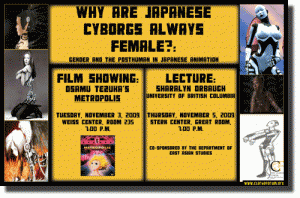Professor of Asian studies and women’s & gender studies, University of British Columbia
Why are Japanese Cyborgs Always Female?
Thursday, November 5, 2009
Stern Center, Great Room, 7:00 p.m.
In the robot, android or cyborg body, sex and gender are constructed and unnecessary rather than biological and functional; nonetheless, most depictions of such post-human entities retain gender and sex markers. This presentation explores the reasons behind this phenomenon in recent Japanese anime films, such as Osamu Tezuka’s Metropolis.
Co-sponsored by the Department of East Asian Studies
Topical Background
According to the Oxford English Dictionary, a cyborg is “a person whose physical tolerances or capabilities are extended beyond normal human limitations by a machine or other external agency that modifies the body’s functioning.”
The idea of the technologically enhanced human has been prevalent in fiction since Edgar Allen Poe wrote of the prosthetic General John A.B.C. Smith in his 1839 short story, “The Man that was Used Up.” Darth Vader, the Terminator, and The Six Million Dollar Man are just a few of the cyborgs that have entered American popular culture. In Japan, cyborgs frequently appear in animated works.
Japanese animation usually depicts cyborgs as female. In the cyborg body, sex and gender are constructed and almost unnecessary, as they serve little biological or functional purpose; nonetheless, most depictions of such posthuman entities retain gender and sex markers.
This phenomenon is present in Osama Tezuka’s 1949 manga (Japanese comic book) Metropolis. In 2001, the manga was adapted into a feature length, animated film by the Japanese director who goes by the name Rintaro. This film explores the posthuman future, in which mechanical and organic beings struggle for dominance. The physical appearance of these animated cyborgs sheds light on the role of gender in Japanese society.
Biography (provided by the speaker)
Sharalyn Orbaugh, professor of Asian studies and women’s & gender studies at the University of British Columbia, is a specialist in modern Japanese literature and cultural studies. Her research addresses issues of race, gender, sexuality and visuality in Japanese fiction and film, as well as popular culture media such as manga and anime.
Video of the Program

